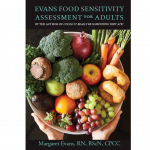
Order the Assessment!
Evans Food Sensitivity Assessment for Adults

What Makes You Feel Loved and Appreciated?
As a support person for your friend or family member with a serious or chronic illness, do you sometimes wonder how best to help them? Do people tell you often how amazing you are in all that you are doing in your role as caregiver but somehow you still feel unappreciated?
Within each of us is an emotional “tank” whose level fluctuates just like the level of gas in your car. When you feel “full”, you feel loved and appreciated. You find it easy to give support to others as you feel satisfied in your own life. When you are faced with challenges, particularly ones that drain your energy over a period of many years, the level in your emotional tank decreases and you can feel tired and discouraged. With no reserves to draw on, you may notice yourself becoming frustrated and impatient and longing for a much needed rest. Finding ways to fill your own emotional tank and the tank of your friend or family member who is ill allows you to reconnect once again to the joy in the relationship.
In his book “The Five Love Languages”, Gary Chapman suggests that we all have a primary love language that makes us feel valued, loved, and appreciated. In your role as caregiver, if you receive appreciation and acknowledgment in your primary language, you will feel full and be able to find the patience and perseverance you need for your journey. If you are able to offer love and support to your ill friend or family member in their primary love language, your efforts will be graciously received and they will truly appreciate all that you do for them.
Read the following descriptions and identify which love language you feel most drawn to. Which one makes you feel most loved and appreciated? Which one contains the type of requests you often make of the people in your life? What are you longing for people to do for you? Ask the person you are supporting with an illness to do the same and then compare what you learn.
WORDS OF AFFIRMATION: You love having people give you words of appreciation and encouragement. You are sensitive to the tone of people’s voices and respond willingly to respectful requests but feel resistance to pushy demands. You love receiving little notes of thanks.
QUALITY TIME: You thrive when people give you their undivided attention. You love spending time with the special people in your life doing things that encourage a feeling of togetherness. You love spending time in quality conversations where you feel respectfully heard. You long to talk until you’re finished without interruption.
RECEIVING GIFTS: You love receiving small, thoughtful gifts that say: “I am thinking about you.” The cost of the gift isn’t important – it’s the thought that counts. Gifts are valued equally whether they are purchased, made or found. You love spontaneous gifts given for no particular reason that say: “I care.”
ACTS OF SERVICE: You love having someone do those little things for you that matter most – anything from changing the oil in your car to washing the dishes after dinner. You feel loved and cared for when people do things spontaneously that are meaningful to you without having to ask.
PHYSICAL TOUCH: You love being gently and lovingly touched – it speaks louder than any gift or any words could ever do. A hand on your shoulder, a soothing back rub, or a warm hug make you feel loved, appreciated and valued.
Supporting someone in your life with a serious or chronic illness is a journey with many joys and many challenges. If you feel appreciated, supported and loved yourself, you will find the inner strength you need to carry on. If you are longing for someone to sit quietly beside you and listen, don’t be afraid to say so. If what you really need is a warm and reassuring hug, go ahead and ask. Honour your friend or family member by asking them, too, what they need. If both of you receive the love and appreciation you need in your primary love language, your relationship will blossom.